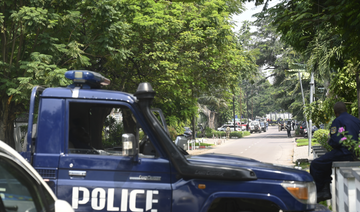DES MOINES, Iowa: Mitt Romney’s exit from the presidential campaign has unleashed a frenzy of fresh fundraising and set off a new race for the backing of donors who had remained loyal to the 2012 Republican nominee.
Big dollars were said to flow immediately on Friday to former Florida Gov. Jeb Bush, who already had won over several of Romney’s past donors. New Jersey Gov. Chris Christie claimed the support of others who were waiting on Romney to make a decision about whether to seek the White House a third time.
Tony Carbonetti, a Christie supporter and top aide to former New York Mayor Rudy Giuliani, a 2008 Republican presidential contender, said every major Republican donor got at least two calls on Friday — one from Christie’s people and one from those promoting Bush. Both Bush and Christie are competing for the support of the party establishment, which includes many donors and fundraisers from Wall Street and business groups.
None of the Republicans considering a run for president has formally entered the race. But most have established political committees that effectively serve as campaigns-in-waiting of varying sophistication. That step allows the politicians to raise money to pay for travel, staff and the logistics of getting ready to run for the White House.
The competition for donors to those organizations is fierce, with commitments signaling the potential strength of a nascent campaign and laying the groundwork for more fundraising to come.
Romney raised more than $57 million before the first voting in 2012, and that figure is often cited as the benchmark for 2016 hopefuls.
Even before Romney’s announcement Friday, Bush had picked off several of Romney’s past supporters. Among them was Lisa Wagner, a top Midwest fundraiser for Romney in 2012 who pushed hard to win over others Friday.
“I’ve raised a million dollars in the four hours since he announced that I otherwise would not have raised,” she said. Her converts included Bill Kunkler, part of Chicago’s wealthy Crown family, who had been holding out for Romney.
Christie had his own pickups. None was more significant than Bobbie Kilberg, a Virginia-based fundraiser who said she and her husband were all-in for the former federal prosecutor.
“We will support him financially and we will be bundlers for him,” she told The Associated Press, referring to the practice of rounding-up donations from friends, family and colleagues for a campaign.
Others were too upset or stunned by Romney’s announcement to decide what to do next. That includes Bill Simmons, a Washington-based donor who raised money for both of Romney’s previous campaigns.
“I haven’t fully thought about the next step,” he said.
Few donors interviewed after Romney’s announcement mentioned the several candidates likely to compete to the right of Christie and Bush. That group includes Kentucky Sen. Rand Paul, Texas Sen. Ted Cruz, former Texas Gov. Rick Perry and former Arkansas Gov. Mike Huckabee.
“Mitt was going to probably occupy a different place on the shelf than me,” Huckabee said. “I don’t know that it has any impact on support, donors. It probably has a bigger impact on Jeb Bush and Chris Christie.”
With Romney’s exit, there may now be room for a third candidate such as Wisconsin Gov. Scott Walker or Florida Sen. Marco Rubio to compete alongside Bush and Christie for the support of establishment-minded donors and fundraisers.
Several Republican donors said Wisconsin Gov. Scott Walker might be that candidate.
The news came at the end of a big week for Walker. He earned a standing ovation from a conservative crowd at a forum in Iowa last Saturday. The next day, he spoke to wealthy conservatives in California at an event organized by the billionaire brothers Charles and David Koch, who have pledged to donate hundreds of millions to the 2016 campaign.
Walker ended the week in Washington as the guest of wealthy Republican donor Fred Malek.
Rubio spent the week courting donors on the West Coast, Texas and Chicago after attending the Koch brothers’ event.
___
Colvin reported from Newark, New Jersey. Associated Press writer Bill Barrow in Atlanta contributed to this report.
Romney’s exit unleashes race for donors among 2016 hopefuls
Romney’s exit unleashes race for donors among 2016 hopefuls
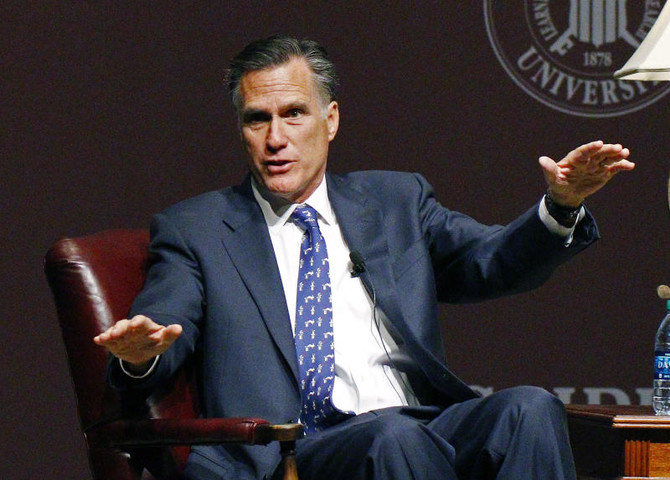
India’s massive election faces heatwave challenge in penultimate phase
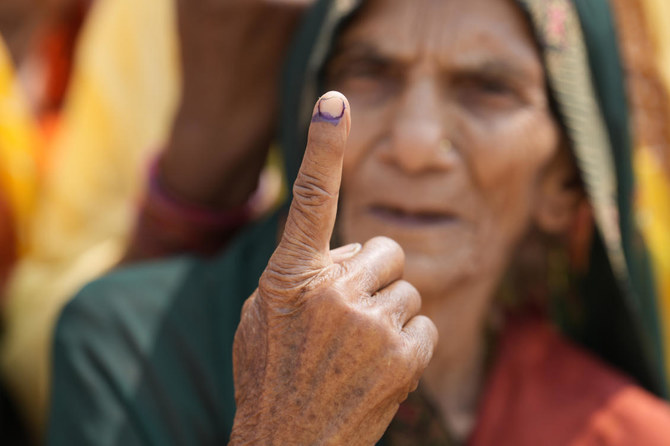
- Next-to-last phase of voting with temperatures forecast to surge to 47° Celsius in the capital New Delhi
- More than 111 million people in 58 constituencies across eight states and federal territories are eligible to vote
More than 111 million people in 58 constituencies across eight states and federal territories are eligible to vote in the general election’s sixth phase, which recorded a turnout of 10.82 percent in the first two hours of the 11-hour poll.
The overall turnout in the same phase of the last elections in 2019 was about 63 percent.
“There is a concern, but we hope that people will overcome the fear of the heatwave and come and vote,” Delhi Chief Electoral Officer P. Krishnamurthy said.
Voting in the elections began on April 19 and will conclude on June 1, with counting set for June 4.
Prime Minister Narendra Modi, leader of the Hindu-nationalist Bharatiya Janata Party (BJP), who is favored to win a third consecutive term, also asked people to “vote in large numbers” in a message on social media platform X on Saturday.
Opposition politician Arvind Kejriwal urged citizens to “vote against dictatorship” Saturday after casting his ballot in the country’s six-week election.
“Please vote, use your right to vote, and vote against dictatorship,” said Kejriwal, leader of the Aam Aadmi party and chief minister of the Delhi region, who was arrested in March in a graft probe and held for several weeks of the election campaign.
The Election Commission has deployed paramedics with medicines and oral hydration salts at polling stations in Delhi, which have additionally been equipped with mist machines, shaded waiting areas and cold water dispensers for voters.
In some parts of the northern state of Haryana, people residing near polling booths also pitched in to help voters beat the heat, handing out cold drinks, dry fruits and milk free of cost.
Among those who cast their ballot early in Delhi were Rahul Gandhi, leader of the main opposition Congress party and Modi’s main rival, his mother Sonia Gandhi and sister Priyanka Vadra.
“We are keeping all our grievances aside and casting our vote for our constitution and democracy,” Vadra told reporters.
Price rise and unemployment were two of the major issues mentioned by voters when asked about the factors that determined their ballot.
“The government boasts about fast economic growth but the reality on the ground is very different,” said Delhi voter Fazal, 46, who only gave his first name and works at a multinational corporation, adding he also voted to “save democracy.”
Ashok Ghana, a plumber in the eastern state of Odisha, who said he voted for the BJP, added that “price rise and the non-availability of jobs” were the issues he considered.
Among those who voted based on the situation in their region was property dealer Praveen Chauhan, 43, in Delhi.
“My main issues are clean water, electricity, access to good health care and education,” he said, adding that the Kejriwal-led Delhi government “has given us that till now.”
While the heatwave was a concern in Delhi, a cyclone that is expected to hit land tomorrow was being closely watched in eastern Odisha and West Bengal, parts of which are also voting on Saturday.
Taiwan calls China’s military drills a ‘blatant provocation’ to world order
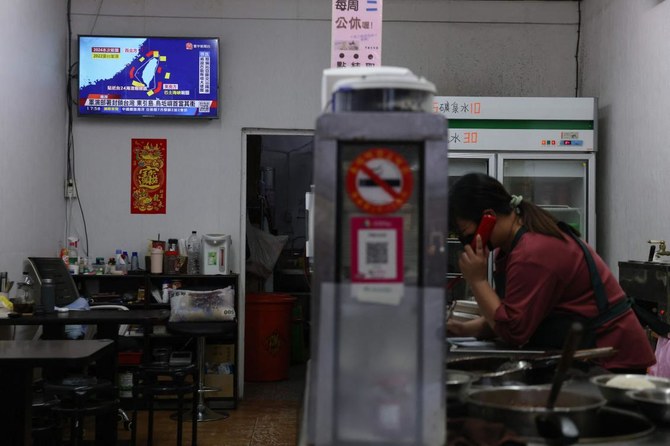
- The drills were launched three days after Taiwan’s President Lai Ching-te took office
- Exercises involved simulating strikes targeting the island’s leaders as well as its ports and airports
TAIPEI: China’s two-day military drills around Taiwan were a “blatant provocation to the international order,” Taipei said in a statement Saturday after the war games encircling the self-ruled island ended.
The drills were launched three days after Taiwan’s President Lai Ching-te took office and made an inauguration speech that China denounced as a “confession of independence.”
China, which claims Taiwan as part of its territory, regards Lai as a “dangerous separatist.”
By Friday evening, a presenter for state-run military news channel CCTV-7 said the Chinese army had “successfully completed” the operation dubbed “Joint Sword-2024A.”
In a statement, Lai’s presidential spokesperson Karen Kuo reiterated that ensuring peace and stability across the region was “related to the common interests of the international community.”
“However, China’s recent unilateral provocation not only undermines the status quo of peace and stability in the Taiwan Strait but it is also a blatant provocation to the international order, triggering serious concern and condemnation from the international community,” she said.
Kuo added that Taiwan hopes “China will take the safety and happiness of the people on both sides into consideration, pursue mutual benefit, coexistence... stop all kinds of political and military intimidations on Taiwan and the region.”
Self-ruled Taiwan has its own democratically elected government, military and currency, but Beijing has said it would never renounce the potential use of force to bring the island under its control.
Chinese military analysts told state news agency Xinhua that the People’s Liberation Army vessels had inched “closer than ever before” to Taiwan’s shores during the two-day military drills.
The exercises involved simulating strikes targeting the island’s leaders as well as its ports and airports, they said.
In regards to China’s various military actions, Kuo said that “the president and the national security team have a full grasp of the situation” and called for the public to “rest assured.”
Utah man declined $100K offer to travel to Congo on ‘security job’ that was covert coup attempt
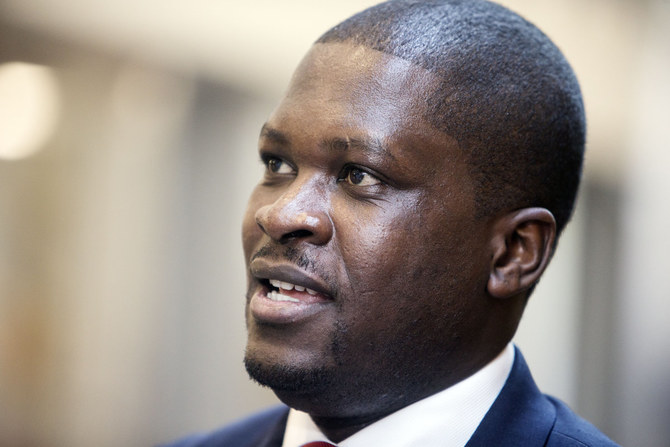
- American Daniel Gonzalez said one of his friends from West Jordan, Utah, was among the 6 killed last week during a foiled coup attempt in DR Congo
- He said the offer was made by the son of coup leader Christian Malanga, who was killed by Congo security forces while resisting arrest
SALT LAKE CITY: The friend of a prominent Congolese opposition leader’s son said he turned down a six-figure offer to travel there from the US as part of the family’s security detail in what turned out to be a failed coup attempt.
Marcel Malanga, the 21-year-old son of eccentric coup leader Christian Malanga, was detained by Congolese forces Sunday morning, along with a former classmate from their hometown of West Jordan, Utah, after his father was killed in a shootout while resisting arrest. His high school football teammate, Tyler Thompson, 21, was one of two other Americans arrested after an ill-fated attack on the presidential palace in Kinshasa.
Six people were dead and dozens arrested, including the three Americans, following that attack and another on the residence of a close ally of President Felix Tshisekedi, the Congolese army spokesperson, Brig. Gen. Sylvain Ekenge, said.
Daniel Gonzalez, a former teammate of the two Utah residents caught up in the foiled coup, told The Associated Press that Marcel had offered him $50,000 to $100,000 to spend four months in Congo as a security guard for his politician father. The 22-year-old FedEx worker strongly considered it, but said it lacked concrete details. He ultimately declined so he could spend the summer with his girlfriend.
“I feel really sad for Tyler and Marcel but, at the end of the day, I can just be grateful that I didn’t go because I would be stuck in the same scary situation,” Gonzalez said.
Marcel’s lucrative offer to Gonzalez sheds light on how he might have enticed Thompson to come along on what his stepmother, Miranda, said was supposed to be a vacation.
It was one of many propositions the coup leader’s American son made to former football teammates in what many described as a desperate effort to bring someone with him to Congo. He pitched the trip to some as a family vacation and still to others as a service trip to build wells in drought-stricken communities.
Although it’s unclear whether Thompson was offered money, multiple teammates told the AP that he had alluded to such incentives, telling one friend that the trip could be a “big financial opportunity.”
Thompson’s family insists he’s a political pawn who was dragged into an international conflict under false pretenses. They’ve had no direct communication with their son since the coup and are worried for his safety, his stepmother said.
Marcel’s mother, Brittney Sawyer, said her son is innocent and had followed his father.
Christian Malanga, the slain leader of the Congolese opposition political party, considered himself president of a shadow government in exile, which he called the “New Zaire.” He described himself on his website as a refugee who settled in Salt Lake City with his family in the 1990s, pursuing business opportunities in gold mining and used car sales before eventually moving back to Congo to fight for political reforms.
While campaigning for the Congolese Parliament, he claimed he was jailed and endured torturous beatings. He later published a manifesto detailing plans to reform Congo’s security services and described his movement as an effort to organize fellow emigres against the “current Congolese dictatorship government regime.”
“Marcel was pretty secretive about his dad. He didn’t even know him well until he spent last summer in Africa,” Gonzalez said. “There’s no way Marcel had any idea what he’d be getting us into or he never would’ve offered. He’s one of the best friends a person could have.”
In the early hours Sunday, Christian Malanga began livestreaming video on social media from inside the palace. He is seen with his armed son, who hastily pulls a neck gaiter over his face, looking around wide-eyed. Congo officials have not commented on how the attackers were able to get inside.
Gonzalez, of Herriman, Utah, said he had communicated with Marcel about the financial offer over Snapchat, in messages that have since disappeared, in the months leading up to the coup attempt. He was shocked to learn how the trip played out.
Marcel had told Gonzalez that his father was letting him hire a friend so he would have company during his summer abroad. He seemed excited to be able to offer such a substantial amount of money to a close friend who needed it, Gonzalez explained.
The Malangas had promised on-the-job training, full coverage of travel expenses and the chance to explore a new part of the world while making an income, he said. Marcel insisted repeatedly that it was safe, but didn’t share details about his father’s background.
Neither Gonzalez nor his mother thought the trip would be unsafe, he said, despite the US State Department strongly discouraging travel to Congo — but he turned it down when his girlfriend asked him not to leave for four months.
He later saw private Snapchat videos filmed by Marcel that showed Thompson looking frightened as armed Congolese soldiers surrounded their vehicle. In Gonzalez’s final Snapchat exchange with his friend before their capture, he asked whether Thompson was OK and urged them to stay safe.
Marcel assured him that they were.
Other former football teammates, including Luke Barbee and Jaden Lalor, had heard different pitches about the trip and wondered why Marcel seemed so desperate to bring someone along. Neither could fathom their friends’ possible involvement in a violent attack.
“I consider Marcel a brother to me and Tyler a friend, and I truly believe Marcel’s father must have pressured them for his own wants,” Lalor said. “I just want them back safely.”
Defense Secretary Lloyd Austin resumes duty after undergoing procedure at Walter Reed
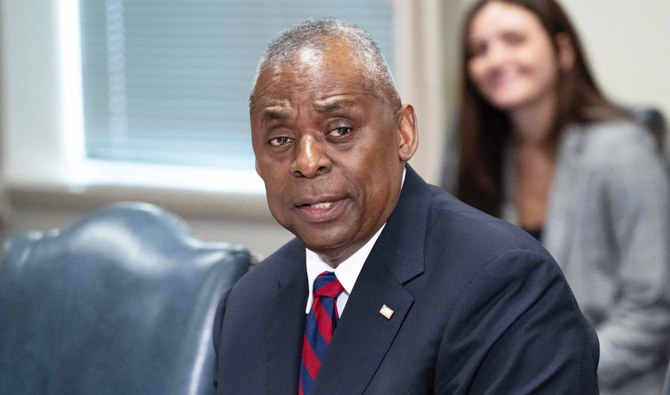
WASHINGTON: Defense Secretary Lloyd Austin underwent a medical procedure at Walter Reed National Military Medical Center Friday evening and has resumed duty after temporarily transferring power to his deputy, Pentagon press secretary Maj. Gen. Pat Ryder said in a statement.
Austin is continuing to deal with bladder issues that arose in December following his treatment for prostate cancer, Ryder said.
The procedure was successful, elective and minimally invasive, “is not related to his cancer diagnosis and has had no effect on his excellent cancer prognosis,” the press secretary said.
Austin transferred authority to Deputy Secretary of Defense Kathleen Hicks for about two-and-a-half hours while he was indisposed, the Pentagon said.
The Pentagon chief returned home after the procedure. “No changes in his official schedule are anticipated at this time, to include his participation in scheduled Memorial Day events,” Ryder said.
Austin, 70, has had ongoing health issues since undergoing surgery to address a prostate cancer diagnosis. He spent two weeks in the hospital following complications from a prostatectomy. Austin faced criticism at the time for not immediately informing the president or Congress of either his diagnosis or hospitalization.
Austin was taken back to Walter Reed in February for a bladder issue, admitted to intensive care for a second time and underwent a non-surgical procedure under general anesthesia at the time.
The Pentagon has notified the White House and Congress, Ryder said.
More than 300 buried in Papua New Guinea landslide, local media says
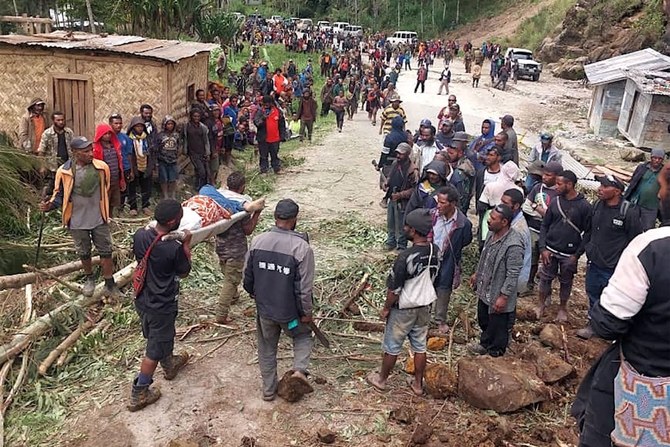
- Hundreds are feared dead in the landslide that hit Kaokalam village
SYDNEY: More than 300 people and over 1,100 houses were buried by a massive landslide that levelled a remote village in northern Papua New Guinea, local media reported on Saturday.
Hundreds are feared dead in the landslide that hit Kaokalam village in Enga Province, about 600 km (370 miles) northwest of capital Port Moresby, around 3 a.m. on Friday (1900 GMT on Thursday).
The landslide in the Pacific nation north of Australia buried more than 300 people and 1,182 houses, the Papua New Guinea Post Courier said, citing comments from a member of the country’s parliament, Aimos Akem. Akem did not immediately respond to Reuters request for comment via social media.
More than six villages had been impacted by the landslide in the province’s Mulitaka region, Australia’s Department of Foreign Affairs and Trade (DFAT) said on Saturday.
“Australia’s High Commission in Port Moresby is in close contact with PNG authorities for further assessments on the extent of the damage and casualties,” a DFAT spokesperson said in a statement.
The Australian Broadcasting Corp. reported on Saturday that four bodies had been retrieved from the area after emergency teams reached the sparsely populated area, where the death toll is expected to rise.
The landslide has blocked highway access, making helicopters the only way to reach the area, the broadcaster reported.
Social media footage posted by villager Ninga Role showed people clambering over rocks, uprooted trees and mounds of dirt searching for survivors. Women could be heard weeping in the background.
Prime Minister James Marape has said disaster officials, the Defense Force and the Department of Works and Highways were assisting with relief and recovery efforts.




